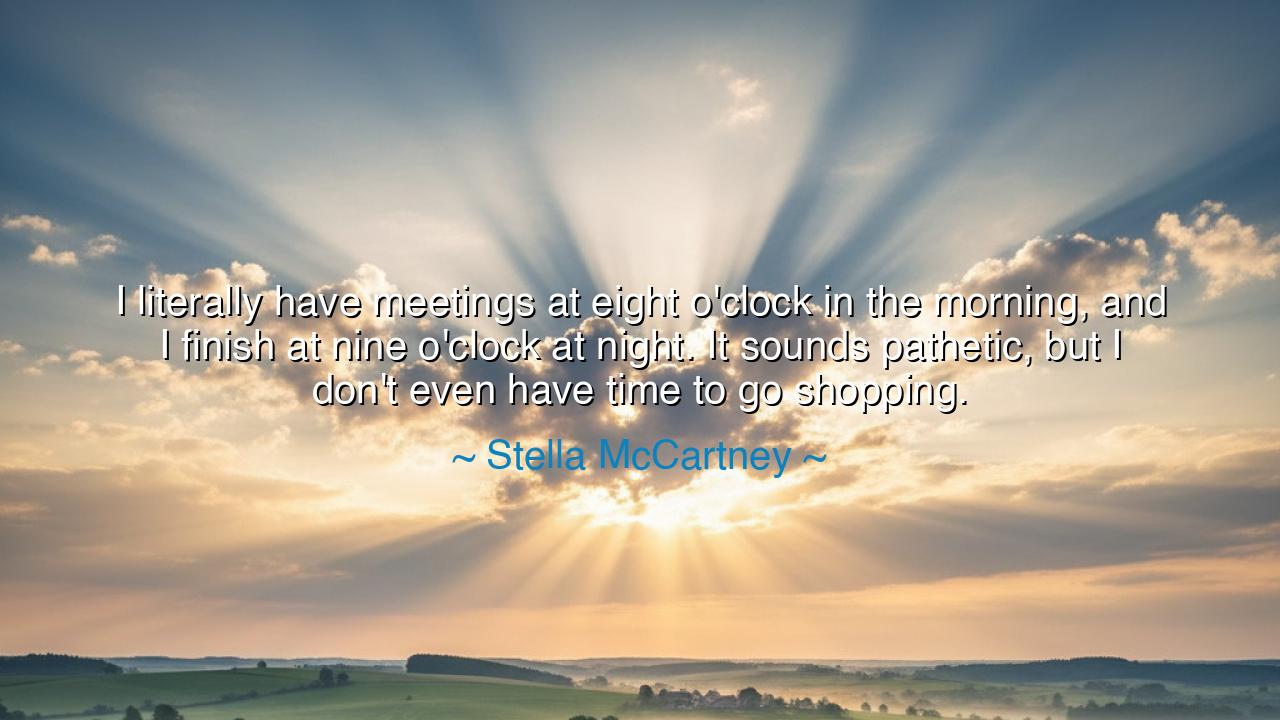
I literally have meetings at eight o'clock in the morning, and I
I literally have meetings at eight o'clock in the morning, and I finish at nine o'clock at night. It sounds pathetic, but I don't even have time to go shopping.






In the relentless march of time, there are moments when one is caught between the demands of duty and the call of personal life. Stella McCartney, a woman whose name is synonymous with innovation and hard work, reflects the essence of this struggle when she says, "I literally have meetings at eight o'clock in the morning, and I finish at nine o'clock at night. It sounds pathetic, but I don't even have time to go shopping." These words reveal a truth that is both modern and ancient: the pursuit of greatness often demands an all-consuming devotion that leaves little room for the simple pleasures of life. McCartney’s struggle is one that transcends time—the battle between work and personal well-being, between the sacrifices we make for our goals and the lives we yearn to lead outside of them.
In the ancient world, the greatest heroes often found themselves caught in this very struggle. The legendary Alexander the Great, who conquered vast lands and forged an empire, was a man whose days were filled with battle, strategy, and political maneuvering. Yet, even in his quest for greatness, there were times when he longed for respite, for a moment of peace away from the demands of leadership. The story of Alexander reminds us that the pursuit of greatness is not without its costs, for even the greatest warriors and rulers must sacrifice their time and personal joys to fulfill their greater destinies. McCartney’s own words echo this timeless truth: when one’s focus is consumed by the need to succeed, personal desires often take a backseat.
What McCartney’s statement speaks to is the overwhelming nature of modern ambition. Her days, filled with back-to-back meetings, reflect the fast-paced world we live in—a world where work often overshadows everything else. Even the gods of ancient Greece, with their mighty powers, were not immune to the pressures of their realms. Zeus, the king of the gods, found himself burdened by the responsibilities of his domain, overseeing the heavens, the earth, and the seas. Despite his godly powers, even he could not escape the weight of duty. McCartney’s struggle is not just hers alone—it is the struggle of anyone who has ever sought to carve out their place in a demanding world.
In our modern era, the rise of ambition has created a landscape where time itself seems to slip through our fingers. The Romans, with their vast empire and military conquests, often lived in a world where the demands of leadership and conquest left little room for personal time. Cicero, a renowned Roman orator and statesman, spent his days in the Senate, in speeches, and in managing his affairs, but even he recognized the need for balance. In his writings, he often spoke of the need to step away from the grind of politics to restore one’s spirit and mind. McCartney’s reflection serves as a modern-day reminder that ambition, while noble, can consume us if we are not careful.
Yet, there is also wisdom in McCartney’s words. In the relentless pursuit of success, we must recognize the cost of that pursuit. It is not pathetic, as McCartney calls it, to acknowledge the toll that work takes on our personal lives. The ancients knew this well—balance is key to enduring greatness. Even the mighty warriors of old, such as the Spartans, were taught that strength was not only physical but mental and emotional. A soldier who overexerted himself, who did not care for his personal well-being, was not a strong soldier at all. In the same way, McCartney’s acknowledgment of her lack of time for personal pleasures reveals a deeper truth: without balance, even the most successful among us may find themselves weary, disconnected from the very life they seek to improve.
The lesson here is clear—while ambition and hard work are essential, so too is rest and rejuvenation. McCartney’s sacrifice of personal time for work is admirable, but it is a cautionary tale for all who seek success. The greatest heroes—whether in the ancient world or the modern one—are those who understand that their efforts must be tempered with moments of reflection, of rest, and of care for the self. A life devoted solely to work can lead to exhaustion, a hollowing of spirit, and the loss of the joy that originally fueled the desire for success.
So, let us take McCartney’s words as a reminder. We must work with vigor, but we must also nurture the life outside of our work—the friendships, the passions, and the simple joys that give our lives meaning. The ancients knew that true greatness was not achieved through endless toil alone, but through the balance of work and rest, of striving and reflection. In this balance, we find our strength, our joy, and our ability to continue, day after day, without losing the essence of who we are.






AAdministratorAdministrator
Welcome, honored guests. Please leave a comment, we will respond soon